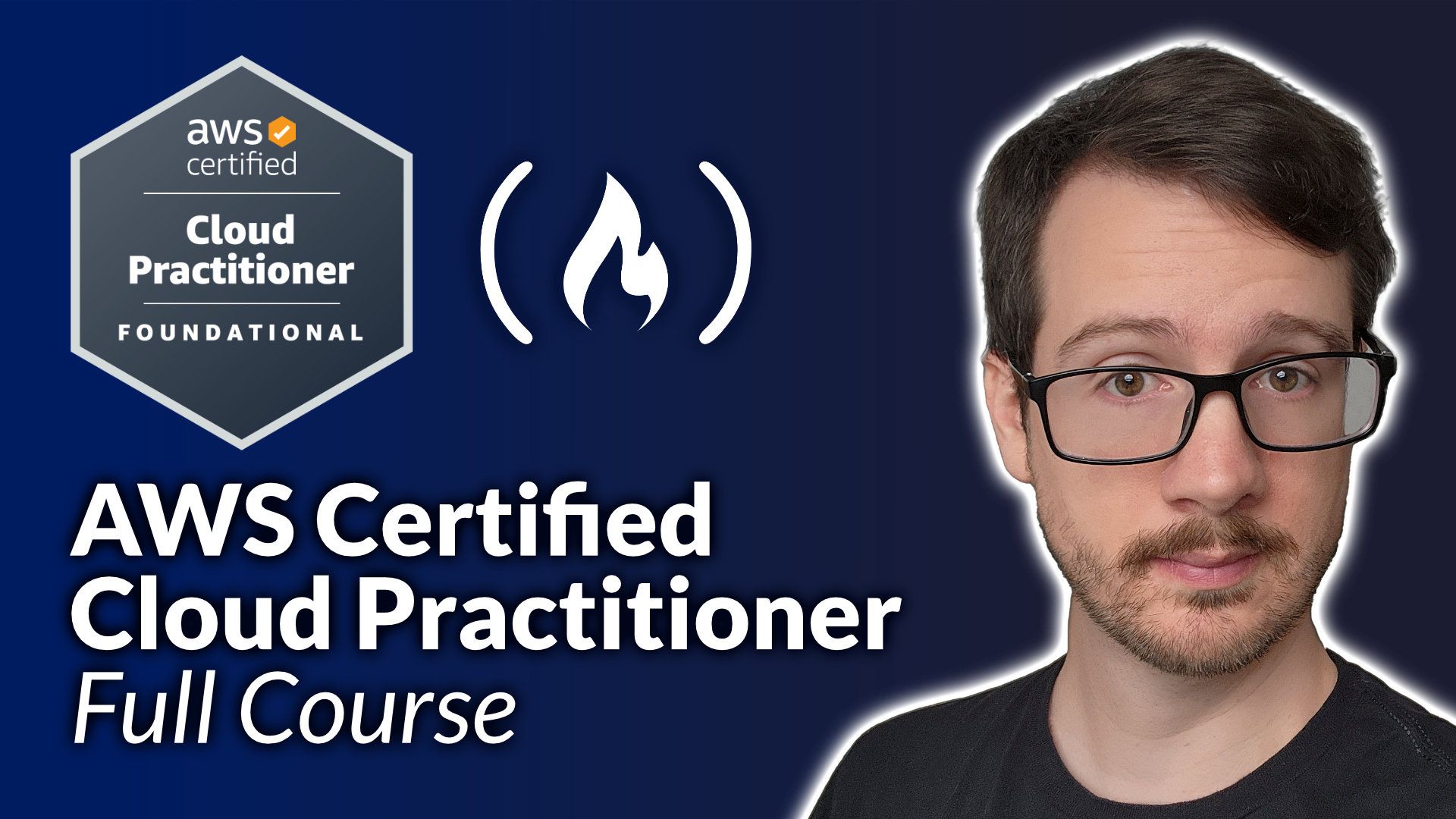Passing the AWS Certified Cloud Practitioner Exam is one of the first steps to a career in cloud development. And freeCodeCamp just published a free 14-hour course that will help you prepare for the exam.
This exam mostly deals with cloud computing concepts. Even if you are new to coding, you should be able to prepare for this exam and earn the AWS certification. Andrew Brown created this course. He is a popular instructor and the CEO of ExamPro.
What is the AWS Certified Cloud Practitioner?
The Certified Cloud Practitioner is the entry-level AWS certification that goes through:
- The cloud fundamentals, for example Cloud Concepts, Cloud Architecture, and Cloud Deployment Models
- A close look at the AWS Core Services
- A quick look at the vast amount of AWS services
- Identity, Security, and Governance of the Cloud
- Billing, Pricing, and Support of AWS Services
The course code is CLF-C02 but its commonly referred to as the CCP.
Amazon Web Services is the leading Cloud Service Provider (CSP) in the world and the AWS Certified Cloud Practitioner is the most common starting point for people breaking into the cloud industry.
Consider the AWS Certified Cloud Practitioner if:
- You are new to cloud and need to learn the fundamentals
- You are in the executive, management, or sales level and need to acquire strategic information about cloud for adoption or migration
- You are a Senior Cloud Engineer or Solutions Architect who needs to reset or refresh your AWS knowledge after working for multiple years
No matter your path towards a cloud role, the AWS Certified Cloud Practitioner provides fundamental knowledge that you shouldn't skip.
Here are all the sections in this comprehensive course:
Introduction
🎤 Is Certified Cloud Practitioner right for me?
🎤 Exam Guide
🎤 Practice Exam Sample
🎤 Case Study Question Type
🎤 Validators
Cloud Concepts
🎤 What is Cloud Computing
🎤 Evolution of Cloud Hosting
🎤 What is Amazon
🎤 What is AWS
🎤 What is a Cloud Service Provider
🎤 Landscape of CSPs
🎤 Gartner Magic Quadrant for Cloud
🎤 Common Cloud Services
🎤 AWS Technology Overview
🎤 AWS Services Preview
🎤 Evolution of Computing
🎤 Types of Cloud Computing
🎤 Cloud Computing Deployment Models
🎤 Deployment Model Use Cases
Getting Started
🎤 Create an AWS Account
🎤 Create IAM User
🎤 AWS Region Selector
🎤 Overbilling Story
🎤 AWS Budgets
🎤 AWS Free Tier
🎤 Billing Alarm
🎤 Turning on MFA
Digital Transformation
🎤 Innovation Waves
🎤 Burning Platform
🎤 Digital Transformation Checklist
🎤 Evolution of Computing Power
🎤 Amazon Braket
The Benefits of Cloud
🎤 The Benefits of the Cloud
🎤 The Six Advantages of Cloud
🎤 The Six Advantages of Cloud Doc Reference
🎤 The Seven Advantages of Cloud
Global Infrastructure
🎤 AWS Global Infrastructure Overview
🎤 AWS Global Infrastructure Follow Along
🎤 Regions
🎤 Regional vs Global Services
🎤 Availability Zones AZs
🎤 Regions and AZ Visualized
🎤 Selecting Regions and Azs Follow Along
🎤 Fault Tolerance
🎤 AWS Global Network
🎤 Points of Presence PoP
🎤 Tier 1
🎤 AWS Services using PoPs
🎤 AWS Direct Connect
🎤 Direct Connect Locations
🎤 AWS Local Zones
🎤 Wavelength Zones
🎤 Data Residency
🎤 AWS for Government
🎤 GovCloud
🎤 AWS in China
🎤 AWS in China Follow Along
🎤 Sustainability
🎤 Sustainability Follow Along
🎤 AWS Ground Station
🎤 AWS Outposts
Cloud Architecture
🎤 Cloud Architecture Terminologies
🎤 High Availability
🎤 High Scalability
🎤 High Elasticity
🎤 Fault Tolerance
🎤 High Durability
🎤 Business Continuity Plan
🎤 Disaster Recovery Options
🎤 RTO Visualized
🎤 RPO Visualized
🎤 Architectural diagram example
🎤 HA Follow Along
Management and Developer Tools
🎤 AWS API
🎤 AWS API Follow Along
🎤 AWS Management Console
🎤 AWS Management Console Follow Along
🎤 Service Console
🎤 Service Console Follow Along
🎤 AWS Account ID
🎤 AWS Account ID Follow Along
🎤 AWS Tools for PowerShell
🎤 AWS Tools for Powershell Follow Along
🎤 Amazon Resource Names
🎤 ARN Follow Along
🎤 AWS CLI
🎤 AWS CLI Follow Along
🎤 AWS SDK
🎤 AWS SDK Follow Along
🎤 AWS CloudShell
🎤 Infrastructure as Code
🎤 CloudFormation
🎤 CloudFormation Follow Along
🎤 CDK
🎤 CDK Follow Along
🎤 AWS Toolkit for VSCode
🎤 Access Keys
🎤 Access Keys Follow Along
🎤 AWS Documentation
🎤 AWS Documentation Follow Along
Shared Responsibility Model
🎤 Introduction to Shared Responsibility Model
🎤 AWS Shared Responsibility Model
🎤 Types of Cloud Responsibilities
🎤 Shared Responsibility for Compute
🎤 Shared Responsibility Model Alternate
🎤 Shared Responsibility Model Architecture
Compute
🎤 EC2 Overview
🎤 VMs Containers and Serverless
🎤 Compute Follow Along
🎤 High Performance Computing HPC
🎤 HPC Follow Along
🎤 Edge and Hybrid
🎤 Edge Computing Follow Along
🎤 Cost Capacity Management
Storage Services
🎤 Types of Storage Services
🎤 Introduction to S3
🎤 S3 Storage Classes
🎤 AWS Snow Family
🎤 Storage Services
🎤 S3 Follow Along
🎤 EBS Follow Along
🎤 EFS Follow Along
🎤 Snow Family Follow Along
Databases
🎤 What is a database
🎤 What is a data warehouse
🎤 What is a key value store
🎤 What is a document database
🎤 NoSQL Database Services
🎤 Relational Database Services
🎤 Other Database Services
🎤 DynamoDB Follow Along
🎤 RDS Follow Along
🎤 Redshift Follow Along
Networking
🎤 Cloud Native Networking Services
🎤 Enterprise Hybrid Networking Services
🎤 Virtual Private Cloud VPC Subnets
🎤 Security Groups vs NACLs
🎤 Security Groups vs NACLs Follow Along
🎤 AWS CloudFront
EC2
🎤 Introduction to EC2
🎤 EC2 Instance Families
🎤 EC2 Instance Types
🎤 Dedicated Host vs Dedicated Instances
🎤 EC2 Tenancy
🎤 Launch an EC2 SSH and Sessions Manager
🎤 Elastic IP
🎤 AMI and Launch Template
🎤 Launch an ASG
🎤 Launch an ALB
🎤 Cleanup
EC2 Pricing Models
🎤 Ec2 Pricing Models
🎤 On Demand
🎤 Reserved Instances
🎤 RI Attributes
🎤 Regional and Zonal RI
🎤 RI Limits
🎤 Capacity Reservations
🎤 Standard vs Convertible RI
🎤 RI Marketplace
🎤 Spot Instances
🎤 Dedicated Instances
🎤 Savings Plan
Identity
🎤 Zero Trust Model
🎤 Zero Trust on AWS
🎤 Zero Trust on AWS with Third Parties
🎤 Directory Service
🎤 Active Directory
🎤 Identity Providers
🎤 Single Sign On
🎤 LDAP
🎤 Multi Factor Authenication
🎤 Security Keys
🎤 AWS IAM
🎤 Anatomy of an IAM Policy
🎤 IAM Policies Follow Along
🎤 Principle of Least Priivilege
🎤 AWS Account Root User
🎤 AWS SSO
Application Integration
🎤 Introduction to Application Integration
🎤 Queueing and SQS
🎤 Streaming and Kinesis
🎤 Pub Sub and SNS
🎤 API Gateway and Amazon API Gateway
🎤 State Machines and AWS Step Functions
🎤 Event Bus and Amazon Event Bridge
🎤 Application Integration Services
Containers
🎤 VMs vs Containers
🎤 What are Microservices
🎤 Kuberenetes
🎤 Docker
🎤 Podman
🎤 Container Services
Governance
🎤 Organizations and Accounts
🎤 AWS Control Tower
🎤 AWS Config
🎤 AWS Config FollowAlong
🎤 AWS Quick Starts
🎤 AWS QuickStarts Follow Along
🎤 Tagging
🎤 Tag Name Follow Along
🎤 Resource Groups
🎤 Resource Groups Follow Along
🎤 Business Centric Services
Provisioning
🎤 Provisioning Services
🎤 AWS Elastic Beanstalk
🎤 AWS Elastic Beanstalk Follow Along
Serverless
🎤 What is Serverless
🎤 Serverless Services
Windows on AWS
🎤 Windows on AWS
🎤 EC2 Windows Follow Along
🎤 AWS License Manager
Logging
🎤 Logging Services
🎤 AWS Cloud Trail
🎤 CloudWatch Alarm
🎤 Anatomy of an Alarm
🎤 Log Streams and Events
🎤 Log Insights
🎤 CloudWatch Metrics
🎤 AWS CloudTrail Follow Along
ML AI BigData
🎤 Introduction to ML and AI
🎤 AI and ML Services
🎤 BigData and Analytics Services
🎤 Amazon QuickSight
🎤 QuickSight Follow Along
🎤 Machine Learning and AI Services Extended
🎤 Generative AI
🎤 ML and DL Frameworks and Tools
🎤 Apache MXNet
🎤 What is Intel
🎤 Intel Xeon Scalable and Intel Gaudi
🎤 What is a GPU
🎤 What is CUDA
AWS Well Architected Framework
🎤 AWS Well Architected Framework
🎤 General Defintions
🎤 On Architecture
🎤 Amazon Leadership Principles
🎤 General Design Principles
🎤 Anatomy of a Pillar
🎤 Operational Excellence
🎤 Security
🎤 Reliability
🎤 Performance Efficiency
🎤 Cost Optimization
🎤 AWS Well Architected Tool
🎤 Well Architected Framework and Tool Follow Along
🎤 AWS Architecture Center
TCO and Migration
🎤 Total Cost of Ownership TCO
🎤 CAPEX vs OPEX
🎤 Shifting IT Personnel
🎤 AWS Pricing Calculator
🎤 AWS Pricing Calculator Follow Along
🎤 Migration Evaluator
🎤 VM Import Export
🎤 Database Migration Service
🎤 Cloud Adoption Framework
Billing and Pricing
🎤 AWS Free Services
🎤 AWS Support Plans
🎤 Technical Account Manager
🎤 AWS Support Follow Along
🎤 AWS Marketplace
🎤 AWS Marketplace Follow Along
🎤 Consolidated Billing
🎤 Consolidated Billing Volume Discounts
🎤 AWS Trusted Advisor
🎤 AWS Trusted Advisor Follow Along
🎤 SLAs
🎤 AWS SLA Examples
🎤 AWS SLA Follow Along
🎤 Service Health Dashboard
🎤 AWS Personal Health Dashboard
🎤 AWS Abuse
🎤 AWS Abuse Report Follow Along
🎤 AWS Free Tier
🎤 AWS Credits
🎤 AWS Partner Network
🎤 AWS Budgets
🎤 AWS Budget Reports
🎤 AWS Cost and Usage Reports
🎤 Cost Allocation Tags
🎤 Billing Alarms
🎤 AWS Cost Explorer
🎤 AWS Cost Explorer Follow Along
🎤 Programmatic Pricing APIs
🎤 AWS Savings Plan Follow Along
Security
🎤 Defense In Depth
🎤 CIA Triad
🎤 Vulnerabilities
🎤 Encryption
🎤 Cyphers
🎤 Cryptographic Keys
🎤 Hashing and Salting
🎤 Digital Signatures and Signing
🎤 In Transit vs At Rest Encryption
🎤 Compliance Programs
🎤 AWS Compliance Programs Follow Along
🎤 Pen Testing
🎤 Pen Testing Follow Along
🎤 AWS Artifact
🎤 AWS Artifact Follow Along
🎤 AWS Inspector
🎤 DDoS
🎤 AWS Shield
🎤 AWS Guard Duty
🎤 AWS Guard Duty Follow Along
🎤 Amazon Macie
🎤 AWS VPN
🎤 AWS WAF
🎤 AWS WAF Follow Along
🎤 Hardware Security Module
🎤 AWS KMS
🎤 AWS KMS Follow Along
🎤 CloudHSM
Variation Study
🎤 Know Your Initialisms
🎤 AWS Config AWS AppConfig
🎤 SNS vs SQS
🎤 SNS vs SES vs PinPoint vs Workmail
🎤 Amazon Inspector vs AWS Trusted Advisor
🎤 Connect Named Services
🎤 Elastic Transcoder vs MediaConvert
🎤 AWS Artifact vs Amazon Inspector
🎤 ELB variants
You can watch the entire course on the freeCodeCamp.org (15-hour course).

